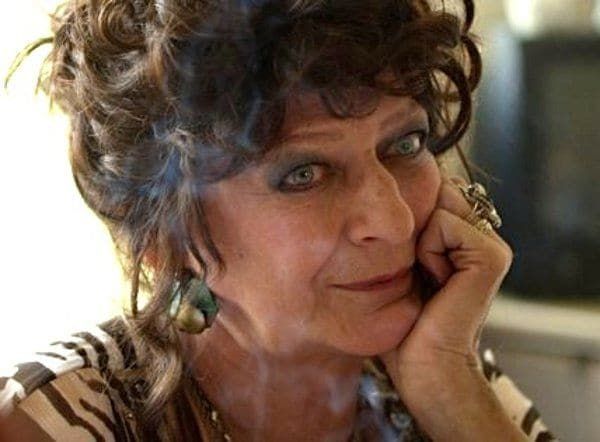Eye For Film >> Movies >> Party Girl (2014) Film Review
Party Girl
Reviewed by: Amber Wilkinson

Creating memorable characters on screen is always a challenge for filmmakers. Not enough detail and they feel flimsy, too much and they can quickly nosedive into caricature. All of which is why casting non-professionals as versions of themselves must surely be appealing - not to mention a considerable budget saving in these economically straitened times - and directors as diverse as Bruno Dumont, Ken Loach and Brillante Mendoza have put the idea to good use.
What marks out the raw and affecting debut feature by directing trio Marie Amachoukeli-Barsacq, Claire Burger and Samuel Theis is the marriage of reality to fiction and an assured cinematic style. They also bring the concept considerably closer to home than most vérité filmmakers, casting Theis' mother Angélique Litzenburger as a version of herself - with he and his siblings in supporting roles, also as variations of the real thing, a technique they previously used in short film Forbach.

Angélique is the party girl of the title, never far from a drink or her next cigarette. A former cabaret dancer now in her sixties, she entertains clients over costly champagne in the sort of nondescript showbar often found near borders, in this case in the region where eastern France meets Germany. The idea of borders runs fast through the film, between countries, people, desires and the false borders we imagine lie between freedom and entrapment.
Angélique wears her jewellery like armour, and her partying has etched itself into her wrinkles - despite the camaraderie of her colleagues, much of the joy the nightlife once held has drained into routine. This change may have been gradual but it can also happen as fast a heart attack, as she discovers when one of the bar's clients - the slightly younger, shyer but ardent Michel (Joseph Bour, also a non-professional, although the most fictional of the characters here) asks her to marry him.
Michel offers the prospect of much more than escape from the cabaret world. His life has an attractive monotony that holds the possibility of a reconnection with her children, in particular, the youngest two who have been raised in foster homes. The directors emphasise contrast, whether it is the stark difference between Michel's casual tracksuit bottoms and Angélique's noisy animal print outfits or the emotional difference between his drinking with pals and her celebrations with her bar colleagues. The question for Angélique becomes not whether Michel is offering her escape but whether it is the sort of escape that she wants.
Amachoukeli-Barsacq, Burger and Theis direct with one voice, staying close to their characters and finding rhythm in the details of dance or a walk - the club girls like a flock of free-range exotic birds contrasting with the controlling masculinity captured elsewhere. The portrayal of the cabaret bar (some great cinematography by Julien Poupard) is particularly well-handled, giving a sense of the goings-on without ever resorting to cheap tricks or voyeurism; women are captured dancing but they are always clothed, allowing us to see past the surface into the energies which drive these sorts of places. Key songs by Chinawoman bookend the film and emphasise the mood.
Angélique is reminiscent of Sebastián Lelio's Gloria - a woman who loves the buzz of a bar but is looking for something, even if she can't articulate what it is. But because the real Angélique lies beneath the fictional veneer, her emotions swim closer to the surface, complex and quite possibly destructive. We are not invited to find her entirely likeable but rather to view her as the sum of her energies and flaws and to see what lies behind her physical and emotional smokescreen. Whatever the outcome for Angélique, the directors' marriage of fiction and fact has been built to last.
Reviewed on: 02 Dec 2014














